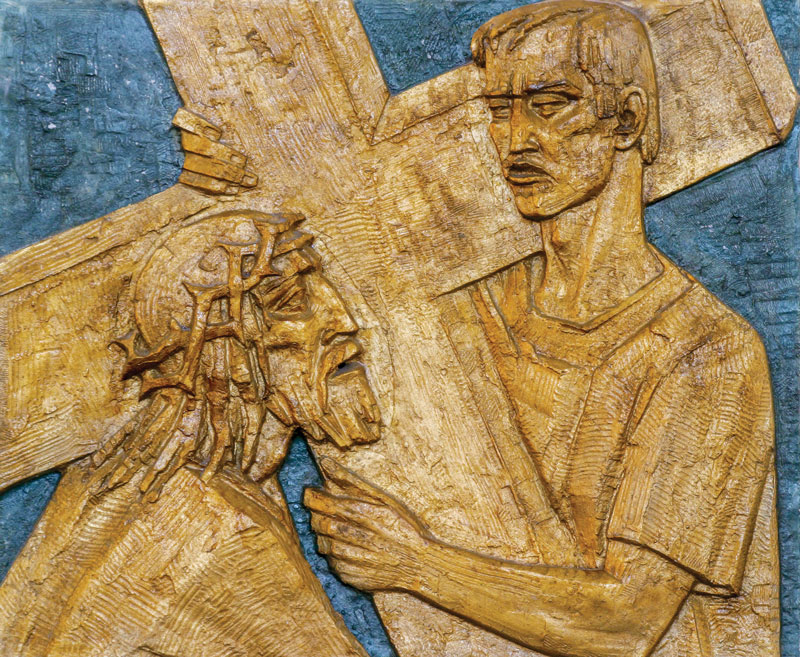Many years ago, when my parents were corps officers at Victoria Citadel, they did a sermon series called “Personalities of the Passion.” With sets, costumes and firstperson monologues, they transported the congregation into the imagined thoughts and feelings of some of the biblical characters in the events leading up to Easter. It was brilliant—the story came alive.
One of those personalities was Simon of Cyrene, the man called upon to carry Jesus’ cross on the way to Golgotha. Watching my father come down the aisle of the old citadel building, dragging a large cross, was very moving, and made me think about what a terrible thing it must have been for Simon.
This part of the story is mentioned in three of the four Gospels—Matthew, Mark and Luke. They all point out that Simon was from Cyrene, a city in what is now Libya. Mark’s Gospel suggests that Simon was travelling from the country into the city when Roman soldiers stopped him.
By this time, Jesus had been beaten so violently that he was weak and unable to continue. I’m not sure why they chose Simon to carry the cross—was it because he was a foreigner? Or that he was the one person going toward the city, instead of following the soldiers and their prisoners to watch yet another Roman execution? Whatever the reason, this man had nothing to do with what was happening in Jerusalem that day, yet he was thrust into the middle of it.
I wonder how he felt. Did he feel discriminated against? Did the cross weigh heavy on his shoulder, on his life? We don’t hear about him again in Scripture, so we can’t be sure.
But there is one interesting detail to note. Mark’s Gospel mentions that Simon was the father of Alexander and Rufus. Perhaps they were all travelling together that day.
Years later, in his greetings at the end of his letter to the Romans, Paul writes: “Greet Rufus, chosen in the Lord, and his mother, who has been a mother to me, too” (Romans 16:13). If this is the same Rufus, then carrying the cross of Jesus had a profound effect on Simon. His son is now “chosen in the Lord,” his wife has treated Paul as an “adopted” son. Perhaps carrying the cross of Christ won an entire family for the kingdom.
We can’t confirm that on this side of heaven, but we can consider if we would serve in this way willingly. Jesus said, “Whoever wants to be my disciple must deny themselves and take up their cross and follow me” (Mark 8:34). These are difficult words to understand in our modern context. Too often, we have beautified the cross.
For Simon, it might have been a lifechanging moment. As he lifted the cross from Jesus’ bruised and bleeding back, he must have wondered what this man had done that was so terrible. Did he stay at the cross during those hours that Jesus hung there? Did he hear the dying thief say, “This man has done nothing wrong” (Luke 23:41)? Did he see Jesus’ mother and the other women watching in anguish? Did he catch the words from Jesus’ own lips: “Father, forgive them, for they do not know what they are doing” (Luke 23:34)?
For us, to carry Jesus’ cross is a lifegiving experience. In Mark 8, after his instructions about taking up the cross, Jesus explains: “For whoever wants to save their life will lose it, but whoever loses their life for me and for the gospel will save it” (Mark 8:35).
When Jesus died on the cross, it was not simply to fulfil a Roman sentence. He died for you and for me, in order that we might have life. We can try to hang on to life as we know it, but until we recognize his sacrifice on the cross, all is lost. But when we do, we come to know life in a whole new way, in relationship to a holy God, all-powerful and all-loving. He wants to bless us with life abundant, but we must take up our cross and follow him. What does that mean for you?
Commissioner Susan McMillan is the territorial commander of the Canada and Bermuda Territory. Follow her at facebook.com/susanmcmillantc and twitter.com/salvationarmytc.
Illustration: © zatletic/depositphotos.com
One of those personalities was Simon of Cyrene, the man called upon to carry Jesus’ cross on the way to Golgotha. Watching my father come down the aisle of the old citadel building, dragging a large cross, was very moving, and made me think about what a terrible thing it must have been for Simon.
This part of the story is mentioned in three of the four Gospels—Matthew, Mark and Luke. They all point out that Simon was from Cyrene, a city in what is now Libya. Mark’s Gospel suggests that Simon was travelling from the country into the city when Roman soldiers stopped him.
By this time, Jesus had been beaten so violently that he was weak and unable to continue. I’m not sure why they chose Simon to carry the cross—was it because he was a foreigner? Or that he was the one person going toward the city, instead of following the soldiers and their prisoners to watch yet another Roman execution? Whatever the reason, this man had nothing to do with what was happening in Jerusalem that day, yet he was thrust into the middle of it.
I wonder how he felt. Did he feel discriminated against? Did the cross weigh heavy on his shoulder, on his life? We don’t hear about him again in Scripture, so we can’t be sure.
But there is one interesting detail to note. Mark’s Gospel mentions that Simon was the father of Alexander and Rufus. Perhaps they were all travelling together that day.
Years later, in his greetings at the end of his letter to the Romans, Paul writes: “Greet Rufus, chosen in the Lord, and his mother, who has been a mother to me, too” (Romans 16:13). If this is the same Rufus, then carrying the cross of Jesus had a profound effect on Simon. His son is now “chosen in the Lord,” his wife has treated Paul as an “adopted” son. Perhaps carrying the cross of Christ won an entire family for the kingdom.
We can’t confirm that on this side of heaven, but we can consider if we would serve in this way willingly. Jesus said, “Whoever wants to be my disciple must deny themselves and take up their cross and follow me” (Mark 8:34). These are difficult words to understand in our modern context. Too often, we have beautified the cross.
For Simon, it might have been a lifechanging moment. As he lifted the cross from Jesus’ bruised and bleeding back, he must have wondered what this man had done that was so terrible. Did he stay at the cross during those hours that Jesus hung there? Did he hear the dying thief say, “This man has done nothing wrong” (Luke 23:41)? Did he see Jesus’ mother and the other women watching in anguish? Did he catch the words from Jesus’ own lips: “Father, forgive them, for they do not know what they are doing” (Luke 23:34)?
For us, to carry Jesus’ cross is a lifegiving experience. In Mark 8, after his instructions about taking up the cross, Jesus explains: “For whoever wants to save their life will lose it, but whoever loses their life for me and for the gospel will save it” (Mark 8:35).
When Jesus died on the cross, it was not simply to fulfil a Roman sentence. He died for you and for me, in order that we might have life. We can try to hang on to life as we know it, but until we recognize his sacrifice on the cross, all is lost. But when we do, we come to know life in a whole new way, in relationship to a holy God, all-powerful and all-loving. He wants to bless us with life abundant, but we must take up our cross and follow him. What does that mean for you?
Commissioner Susan McMillan is the territorial commander of the Canada and Bermuda Territory. Follow her at facebook.com/susanmcmillantc and twitter.com/salvationarmytc.
Illustration: © zatletic/depositphotos.com










Leave a Comment